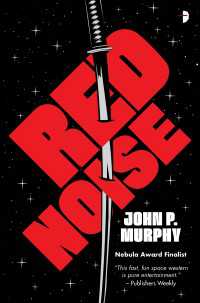- ホーム
- > 洋書
- > 英文書
- > Religion / Ethics
Full Description
This reader with commentary helps Christians understand and critically examine major arguments that have been made in the Western intellectual tradition through an examination of great texts. The book explores themes related to the natural world, human nature, politics, and God.
The core of a liberal arts education lies in the debates made possible by a shared set of texts and questions. Combining their expertise in science, theology, political science, and history, the authors guide readers through the most important sections of classic texts from the Reformation to the modern era, explaining their significance and the debates they sparked. The texts are organized around four themes: God, science, society, and human nature. Rather than simply summarizing the texts, this introduction presents them in a way that allows readers to engage directly with the material. The authors provide historical context, point out potential themes and connections, and encourage readers to explore the ideas and questions the texts raise. Reflection questions are included.
This book facilitates teaching for professors from a wide variety of disciplines and will work well for students in great books courses. In addition, it will be of interest to Christian classical learning organizations, including high schools.
Contents
Introduction: Why Study the Christian Liberal Arts Tradition
Part 1: Introduction to Theology
1. The Schleitheim Confession (1527) by Michael Sattler and others
2. Institutes of the Christian Religion (1559) by John Calvin
3. The Interior Castle (1577) by Teresa of Ávila
4. Pensées [Thoughts] (ca. 1660) by Blaise Pascal
5. "Salvation by Faith" (1738) by John Wesley; "Free Grace: And Can It Be That I Should Gain" (1738) by Charles Wesley
6. "On the Death of Whitefield" (1770); "A Hymn to the Evening" and "On Being Brought from Africa to America" (1773); "On the Death of General Wooster" (1778) by Phillis Wheatley
7. The Age of Reason (1794) by Thomas Paine
8. The Way of Holiness (1845) by Phoebe Worrall Palmer
9. On the Genealogy of Morality (1887) by Friedrich Nietzsche
10. Orthodoxy (1908) by G. K. Chesterton
Part 2: Introduction to History of Science
11. On the Revolutions of Heavenly Spheres (1543) by Nicolaus Copernicus
12. "Letter to the Grand Duchess Christina" (1615) by Galileo Galilei
13. The New Organon, Or True Directions Concerning the Interpretation of Nature (1620) by Francis Bacon
14. The World (1664) by René Descartes
15. Observations upon Experimental Philosophy (1666) by Margaret Cavendish
16. "General Scholium" to the Principia (1726) by Isaac Newton
17. "A Lecture on Earthquakes" (1755) by John Winthrop
18. On the Origin of Species (1859) by Charles Darwin
19. The Principles of Psychology (1890) by William James
Part 3: Introduction to Politics
20. De Indis (1539) by Francisco de Vitoria; and Mare Liberum (1609) by Hugo Grotius
21. A Short Account of the Destruction of the Indies (1542) by Bartolomé de las Casas
22. Leviathan (1651) by Thomas Hobbes
23. Second Treatise of Government (1689) and Letter Concerning Toleration (1689) by John Locke
24. A Discourse on the Origin of Inequality (1755) and The Social Contract (1762) by Jean-Jacques Rousseau
25. The Theory of Moral Sentiments (1759) and An Inquiry into the Nature and Causes of the Wealth of Nations (1776) by Adam Smith
26. Federalist No. 10 (1787) and Federalist No. 51 (1788) by James Madison
27. Reflections on the Revolution in France (1790) by Edmund Burke
28. The Communist Manifesto (1848) by Karl Marx
Part 4: Introduction to Human Nature
29. Concerning Christian Liberty (1520) by Martin Luther
30. "On Cannibals" (1580) by Michel de Montaigne
31. Womens Speaking Justified (1666) by Margaret Fell
32. A Vindication of the Rights of Woman (1792) by Mary Wollstonecraft
33. "Memorial to the Massachusetts Legislature" (1843) by Dorothea Dix
34. "What, to the Slave, Is the Fourth of July?" (1852) by Frederick Douglass
35. Illustrations of Universal Progress (1865) by Herbert Spencer
36. "We Are All Bound Up Together" (1866); "Dandelions" (1896); and "A
Double Standard" (1898) by Frances Ellen Watkins Harper
37. The Souls of Black Folk (1903) by W. E. B. Du Bois
-

- 電子書籍
- 不良がネコに助けられてく話【分冊版】 …
-

- 洋書電子書籍
- Red Noise






